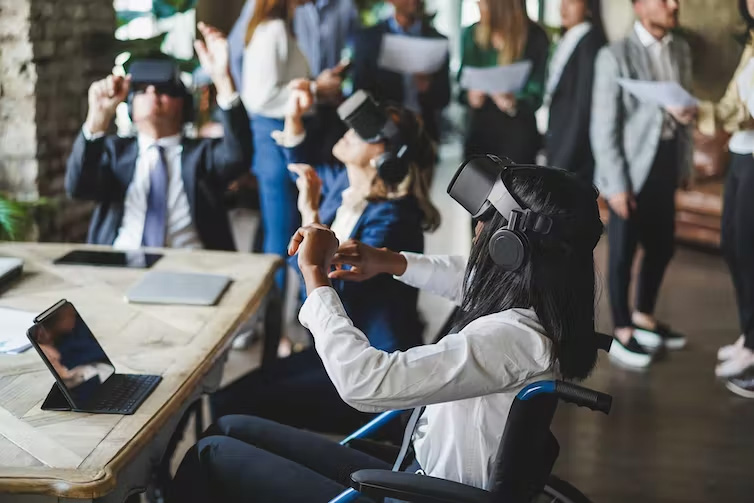How Meta Education Technology Shapes the Future of Learning

The Dawn of a Cognitive Revolution
In the age of accelerated digital transformation, meta education technology stands at the forefront of a pedagogical renaissance. This emergent paradigm fuses artificial intelligence, immersive environments, and decentralized systems to create a learning experience that is both hyper-personalized and universally accessible. By integrating real-time analytics, adaptive content delivery, and neuro-responsive interfaces, this technology redefines the boundaries of traditional education.
The implications are profound. Learners are no longer confined to static curricula or institutional silos. Instead, they engage with dynamic, self-evolving ecosystems that respond to individual cognitive rhythms and global trends. This shift marks the beginning of a cognitive revolution—one that prioritizes intellectual autonomy, emotional intelligence, and interdisciplinary fluency.
Immersive Learning Environments
Virtual and augmented realities are transforming the classroom into a multidimensional arena. Students can now explore ancient civilizations, manipulate quantum particles, or simulate complex surgical procedures—all within a controlled, interactive framework. These environments foster experiential learning, where abstract theories are rendered tangible and intuitive.
Such immersion cultivates deeper engagement and retention. Learners absorb information not through rote memorization but through sensory integration and contextual exploration. This approach nurtures critical thinking, creativity, and problem-solving skills, preparing individuals to navigate an increasingly complex world.
Decentralized Knowledge Systems
The rise of blockchain and distributed ledger technologies has catalyzed the decentralization of educational credentials and content. Learners can now acquire micro-certifications, store achievements in secure digital wallets, and share their portfolios across global platforms. This dismantles the gatekeeping mechanisms of traditional institutions and democratizes access to quality education.
Peer-to-peer learning networks are also gaining traction. These systems enable individuals to teach, learn, and collaborate without hierarchical constraints. Knowledge becomes a communal asset, exchanged freely and enriched through diverse perspectives. This model fosters inclusivity, equity, and innovation in educational practices.
Neuroadaptive Interfaces and Cognitive Analytics
Advancements in brain-computer interfaces and biometric sensors are ushering in a new era of neuroadaptive learning. These technologies monitor neural activity, emotional states, and engagement levels to tailor content delivery in real time. The result is a learning experience that aligns with the learner’s mental and emotional landscape.
Cognitive analytics further enhance this personalization. By analyzing patterns in behavior, comprehension, and interaction, intelligent systems can predict learning trajectories and recommend optimal pathways. This data-driven approach ensures that education is not only effective but also empathetic and responsive.
Ethical Considerations and Digital Integrity
As technology permeates education, ethical stewardship becomes paramount. Issues surrounding data privacy, algorithmic bias, and intellectual property must be addressed with rigor and transparency. Learners must be empowered with digital rights—the ability to control their data, identity, and educational journey.
Institutions and developers must collaborate to establish ethical frameworks that safeguard autonomy and equity. These frameworks should prioritize inclusivity, accountability, and cultural sensitivity, ensuring that technological advancement does not exacerbate existing disparities but rather mitigates them.
Lifelong Learning and Fluid Competency Models
The concept of education as a finite phase is rapidly dissolving. Lifelong learning is emerging as a societal imperative, supported by fluid competency models that evolve with technological and economic shifts. Individuals will continuously acquire, refine, and repurpose skills throughout their lives.
Adaptive learning platforms will play a crucial role in this transformation. These systems will curate personalized learning paths based on real-time labor market data, personal interests, and global developments. Education will become a dynamic companion, guiding individuals through the complexities of modern existence with agility and foresight.
Global Collaboration and Cultural Resonance
Technology is bridging geographical and cultural divides, enabling learners from disparate regions to collaborate on shared challenges. Real-time translation tools, culturally responsive content, and inclusive design principles will foster global literacy and empathy.
International coalitions will emerge to standardize educational protocols, share innovations, and promote equitable access. These alliances will ensure that the future of learning is not only technologically advanced but also socially conscious and globally resonant.
Toward an Enlightened Epoch
The trajectory of learning is being irrevocably altered. It is becoming more intelligent, immersive, and inclusive. The convergence of advanced technologies, decentralized systems, and ethical governance is paving the way for an enlightened epoch—one where education is not a privilege but a universal right, and where learning is not a transaction but a transformative experience.
This future will be shaped not by institutions alone, but by individuals empowered to chart their own intellectual journeys. It will be a world where knowledge flows freely, creativity flourishes, and the pursuit of wisdom becomes a shared endeavor across borders, cultures, and generations.




